 In a provocative op-ed piece, Jarle Breivik, a professor of medicine at the University of Oslo, takes aim at the National Cancer Moonshot Initiative announced earlier this year by President Obama. Nice try, he concedes -- but the reality is: "We’re a lot better at fighting cancer. We just can’t cure it." Is this stereotypical Norwegian pessimism or just some badly needed Scandinavian bluntness? Dr. Breivik points out that cancer is fundamentally a disease of aging, and none of us is getting any younger. All our efforts to improve lifespan end up putting us at risk of living long enough that we'll get some form of cancer...
In a provocative op-ed piece, Jarle Breivik, a professor of medicine at the University of Oslo, takes aim at the National Cancer Moonshot Initiative announced earlier this year by President Obama. Nice try, he concedes -- but the reality is: "We’re a lot better at fighting cancer. We just can’t cure it." Is this stereotypical Norwegian pessimism or just some badly needed Scandinavian bluntness? Dr. Breivik points out that cancer is fundamentally a disease of aging, and none of us is getting any younger. All our efforts to improve lifespan end up putting us at risk of living long enough that we'll get some form of cancer...
News
Hackathons Bring Open Source Innovation to Humanitarian Aid
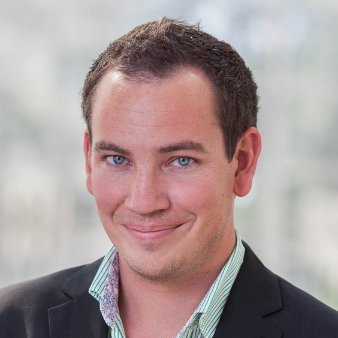 In open source software, end users, decision makers, subject matter experts, and developers from around the world can work together to create great solutions. There are a lot of mature open source projects out there already in the field of humanitarian and development aid, for example: Ushahidi and Sahana in crisis management and information gathering, OpenMRS for medical records, Martus for secure information sharing in places with limited freedom of speech, and Mifos X, an open platform for financial inclusion for people in poor areas where financial services such as savings, payments, and loans are not offered...
In open source software, end users, decision makers, subject matter experts, and developers from around the world can work together to create great solutions. There are a lot of mature open source projects out there already in the field of humanitarian and development aid, for example: Ushahidi and Sahana in crisis management and information gathering, OpenMRS for medical records, Martus for secure information sharing in places with limited freedom of speech, and Mifos X, an open platform for financial inclusion for people in poor areas where financial services such as savings, payments, and loans are not offered...
- Login to post comments
- News
The Story of Ultimaker: 3D Printers with Open Source DNA
 Today we're seeing open hardware projects and businesses succeed for the first time in history. Why, and what do they look like? The story of the Ultimaker and its user community proves that being open is in fact sustainable and may even go a step further to say that that sharing and collaboration are genuine routes to innovation. Let's go back several years to a makerspace in Utrecht, a big city in the Netherlands. The founders of Ultimaker, a premium 3D printer manufacturer, were inspired by the potential of 3D printing, and experimenting with the open source designs of the RepRap project...
Today we're seeing open hardware projects and businesses succeed for the first time in history. Why, and what do they look like? The story of the Ultimaker and its user community proves that being open is in fact sustainable and may even go a step further to say that that sharing and collaboration are genuine routes to innovation. Let's go back several years to a makerspace in Utrecht, a big city in the Netherlands. The founders of Ultimaker, a premium 3D printer manufacturer, were inspired by the potential of 3D printing, and experimenting with the open source designs of the RepRap project...
- Login to post comments
- News
Fewer Moonshots, More Walks
- Login to post comments
- News
Council of the European Union calls for full open access to scientific research by 2020
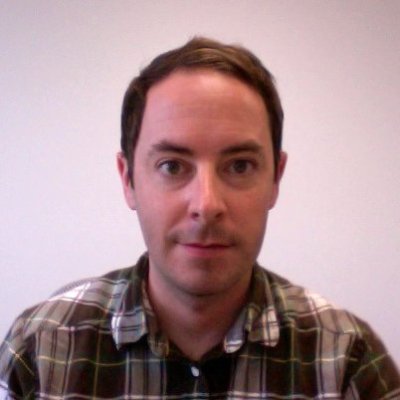 A few weeks ago we wrote about how the European Union is pushing ahead its support for open access to EU-funded scientific research and data. Today at the meeting of the Competitiveness Council of the European Union, the Council reinforced the commitment to making all scientific articles and data openly accessible and reusable by 2020. In its communication, the Council offered several conclusions on the transition towards an open science system:
A few weeks ago we wrote about how the European Union is pushing ahead its support for open access to EU-funded scientific research and data. Today at the meeting of the Competitiveness Council of the European Union, the Council reinforced the commitment to making all scientific articles and data openly accessible and reusable by 2020. In its communication, the Council offered several conclusions on the transition towards an open science system:
- Login to post comments
- News
Which Bionic Limb to Prescribe? VA's Gait Lab Aims to Build Evidence-Based High-Tech Prosthetics
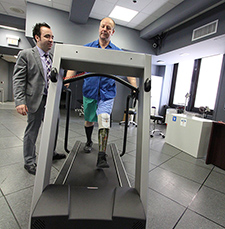 Prosthetics has come a long way—witness the $35,000 computerized knee that sits on a table in Maikos' Gait and Motion Analysis Lab, coupled with a $30,000 bionic foot. The high-tech components are awaiting testing with Veteran amputees who come to the lab. Some have lost a leg to an IED or rocket-propelled grenade in Iraq or Afghanistan—or perhaps to a mine or mortar blast decades ago in Vietnam. Others have lost a foot or leg in an accident, or to diabetes or vascular disease. The purpose of the tests is twofold: to help determine the best prescription for the Veterans, and to gather research data. Along with gait abnormalities, Maikos studies functional outcomes such as walking speed and distance.
Prosthetics has come a long way—witness the $35,000 computerized knee that sits on a table in Maikos' Gait and Motion Analysis Lab, coupled with a $30,000 bionic foot. The high-tech components are awaiting testing with Veteran amputees who come to the lab. Some have lost a leg to an IED or rocket-propelled grenade in Iraq or Afghanistan—or perhaps to a mine or mortar blast decades ago in Vietnam. Others have lost a foot or leg in an accident, or to diabetes or vascular disease. The purpose of the tests is twofold: to help determine the best prescription for the Veterans, and to gather research data. Along with gait abnormalities, Maikos studies functional outcomes such as walking speed and distance.
- Login to post comments
- News
New Open Source Program Director Supports Students' Passions at the Rochester Institute of Technology
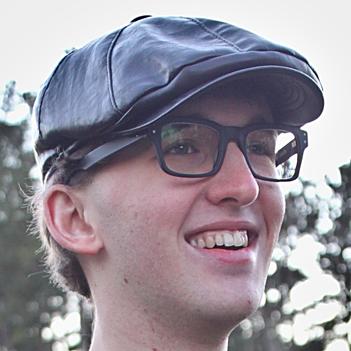 The Rochester Institute of Technology (RIT) is well-known for its work in open source software through FOSS@MAGIC. In April 2014, RIT started to offer a minor in free and open source software. Students work on several different open source projects in their GitHub organization. One of the courses in the minor, Humanitarian Free and Open Source Software Development, has students work with the One Laptop per Child XO laptops. Students create games that help teach New York and Massachusetts fourth grade math curriculum. Dan Schneiderman is the new head of the FOSS@MAGIC program at RIT...
The Rochester Institute of Technology (RIT) is well-known for its work in open source software through FOSS@MAGIC. In April 2014, RIT started to offer a minor in free and open source software. Students work on several different open source projects in their GitHub organization. One of the courses in the minor, Humanitarian Free and Open Source Software Development, has students work with the One Laptop per Child XO laptops. Students create games that help teach New York and Massachusetts fourth grade math curriculum. Dan Schneiderman is the new head of the FOSS@MAGIC program at RIT...
- Login to post comments
- News
Open Source Marketing: Brands Matter—and Sharing Is Always Better
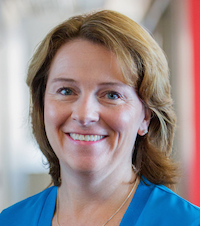 Marketing as we know it has changed dramatically, especially in the B2B world. I bet you're not surprised to hear me say that. I'm not the first to say it, and I certainly won't be the last. Observing changes to companies' methods for engaging their customers is the easy part. What's harder is understanding the nature of those changes and what they mean for you and your marketing teams. But as luck would have it, I recently found some help thinking through this a few weeks ago, when my local chapter of the American Marketing Association asked me to participate in a panel on the future of marketing...
Marketing as we know it has changed dramatically, especially in the B2B world. I bet you're not surprised to hear me say that. I'm not the first to say it, and I certainly won't be the last. Observing changes to companies' methods for engaging their customers is the easy part. What's harder is understanding the nature of those changes and what they mean for you and your marketing teams. But as luck would have it, I recently found some help thinking through this a few weeks ago, when my local chapter of the American Marketing Association asked me to participate in a panel on the future of marketing...
- Login to post comments
- News
HHS CTO Susannah Fox on Health Datapalooza
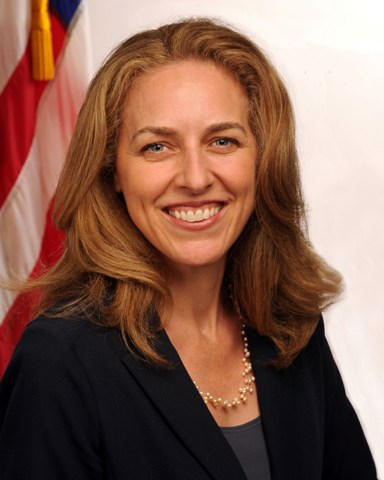 Every spring, our team in the HHS IDEA Lab gears up for our biggest event of the year: the Health Datapalooza. It’s an annual celebration of the power of data that was started by my predecessor, Todd Park, in 2010. This year, we were honored to hear from an extraordinary lineup of leaders from private industry, academia and the federal government, including Vice President Biden. I thought I’d share excerpts from three of my colleagues’ speeches, to give people a sense of the scope and depth of the discussions.
Every spring, our team in the HHS IDEA Lab gears up for our biggest event of the year: the Health Datapalooza. It’s an annual celebration of the power of data that was started by my predecessor, Todd Park, in 2010. This year, we were honored to hear from an extraordinary lineup of leaders from private industry, academia and the federal government, including Vice President Biden. I thought I’d share excerpts from three of my colleagues’ speeches, to give people a sense of the scope and depth of the discussions.
- Login to post comments
- News
Raymond's "The Cathedral and the Bazaar" Continues to Impact the Open Source Movement
 Nineteen years ago this week, at an annual meeting of Linux-Kongress in Bavaria, an American programmer named Eric Raymond delivered the first version of a working paper he called "The Cathedral and the Bazaar." According to Raymond, the exploratory and largely speculative account of some curious new programming practices contained "no really fundamental discovery." But it brought the house down. "The fact that it was received with rapt attention and thunderous applause by an audience in which there were very few native speakers of English seemed to confirm that I was onto something," Raymond wrote a year later, as his treatise blossomed into a book...
Nineteen years ago this week, at an annual meeting of Linux-Kongress in Bavaria, an American programmer named Eric Raymond delivered the first version of a working paper he called "The Cathedral and the Bazaar." According to Raymond, the exploratory and largely speculative account of some curious new programming practices contained "no really fundamental discovery." But it brought the house down. "The fact that it was received with rapt attention and thunderous applause by an audience in which there were very few native speakers of English seemed to confirm that I was onto something," Raymond wrote a year later, as his treatise blossomed into a book...
- Login to post comments
- News
Practicing in an Age of Uncertainty
 If you've ever had a hard time trying to decide what's best for your health (e.g., Sorry, There's Nothing Magical About Breakfast), perhaps you can take comfort in the fact that physicians often aren't so sure either. Or perhaps not. A new study in Annals of Surgery, and nicely reported on by Julia Belluz in Vox, focused on surgical uncertainty. The researchers sent four detailed clinical vignettes to a national sample of surgeons, seeking to get their assessment on the risks/benefits of operative and non-operative treatment, as well as their recommendations. You'd like to think there was good consensus on what to do, but that was not the case...
If you've ever had a hard time trying to decide what's best for your health (e.g., Sorry, There's Nothing Magical About Breakfast), perhaps you can take comfort in the fact that physicians often aren't so sure either. Or perhaps not. A new study in Annals of Surgery, and nicely reported on by Julia Belluz in Vox, focused on surgical uncertainty. The researchers sent four detailed clinical vignettes to a national sample of surgeons, seeking to get their assessment on the risks/benefits of operative and non-operative treatment, as well as their recommendations. You'd like to think there was good consensus on what to do, but that was not the case...
- Login to post comments
- News